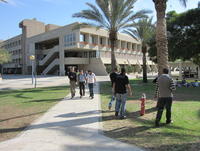-
China steals confidential data on the vulnerabilities of major U.S. dams

The U.S. Army Corps of Engineers’ National Inventory of Dams(NID) contains critical information on the vulnerabilities of the roughly 8,100 major dams in the United States. Between January and April 2013, U.S. intelligence agencies spotted several attempts by China’s People’s Liberation Army (PLA) cyber-espionage unit to access the NID database and steal its contents. On Monday, National Weather Service (NWS) hydrologist Xiafen “Sherry” Chen, 59 was arrested for allegedly breaching the NID security and stealing confidential data on U.S. dam vulnerabilities. The Justice Department has raised the alarm over multiple attempts by China to steal data on U.S. critical infrastructure through individuals with privileged access to confidential databases.
-
-
FBI wants Congress to mandate backdoors in tech devices to facilitate surveillance
In response to announcements by Appleand Googlethat they would make the data customers store on their smartphones and computers more secure and safer from hacking by law enforcement, spies, and identity thieves, FBI director James Comey is asking Congress to order tech companies to build their devices with “backdoors,” making them more accessible to law enforcement agencies.Privacy advocates predict that few in Congress will support Comey’s quest for greater surveillance powers.
-
-
Social media firms pledging to keep users anonymous still collect users’ information
Social media firm Whisperprides itself on offering anonymity in a market where the biggest players are often considered too transparent. Its co-founder, Michael Heyward, a tech entrepreneur, describes the company as “the first completely anonymous social network,” an alternative to Facebookand Twitter. It now emerges that Whisper’s back-end systems that retain digital libraries of texts and photographs sent by users, and in some cases the location information of users.
-
-
Surge in cyberattacks drives growth in cybersecurity insurance
More than 3,000 American businesses were hacked in 2013, many of them small and mid-size firms without cybersecurity insurance. That surge in cyberattacks has led to a growing cybersecurity industry, with firms offering products and solutions to secure network systems. Insurance companies are also claiming their stake in the booming industry. Today, roughly fifty U.S. companies offer cybersecurity insurance. American businesses will spend up to $2 billion on cyber-insurance premiums this year, a 67 percent increase from the $1.2 billion spent in 2013.
-
-
U.S. should emulate allies in pushing for public-private cybersecurity collaboration
Israeli Prime Minister Benjamin Netanyahu announced last month the formation of a national cyber defense authority to defend civilian networks under the leadership of the Israel National Cyber Bureau.The “U.S. government has a lot to learn from successful examples in allied nations. With more compromise and reform, there is plenty of reason for hope,” says a cybersecurity expert, adding that “a cybersecurity partnership between government, business, and individuals built on trust is possible, and would promote more resilient networks as well as creative thinking on cybersecurity.”
-
-
State, local governments aim to strengthen cybersecurity staff despite shrinking budgets
Due to increased cyberattacks on state and local government servers, many leaders are looking to strengthen the cybersecurity staff on their payrolls. Lower levels of government are also worried about cybercrime due to the large amounts of personal and confidential data that they store. Demand for cybersecurity experts is more than double the workplace demand for IT specialists.
-
-
New Web privacy system would revolutionize surfing safety
Scientists have built a new system that protects Internet users’ privacy while increasing the flexibility for Web developers to build Web applications that combine data from different Web sites, dramatically improving the safety of surfing the Web. The system, “Confinement with Origin Web Labels,” or COWL, works with Mozilla’s Firefox and the open-source version of Google’s Chrome Web browsers and prevents malicious code in a Web site from leaking sensitive information to unauthorized parties, while allowing code in a Web site to display content drawn from multiple Web sites — an essential function for modern, feature-rich Web applications.
-
-
New cyber initiative to put Israel’s Beer-Sheva region on the world’s cyber map
Ben-Gurion University of the Negev is a central component of the new CyberSpark initiative, an ecosystem with all the components which will allow it to attain a position of global leadership in the cyber field. The CyberSpark initiative is the only complex of its type in the world – a government-academic-industry partnership which includes Fortune 500 companies and cyber-incubators, academic researchers and educational facilities, as well as national government and security agencies. The CyberSpark Industry Initiative will serve as a coordinating body for joint cyber industry activities with government agencies, the Israel Defense Force (IDF), and academia.
-
-
$3 million in grants for three pilot projects to improve online security, privacy
The National Institute of Standards and Technology (NIST) the other day announced nearly $3 million in grants that will support projects for online identity protection to improve privacy, security and convenience. The three recipients of the National Strategy for Trusted Identities in Cyberspace (NSTIC) grants will pilot solutions that make it easier to use mobile devices instead of passwords for online authentication, minimize loss from fraud and improve access to state services.
-
-
New approach to computer security: Wrist-bracelet

In a big step for securing critical information systems, such as medical records in clinical settings, researchers have created a new approach to computer security that authenticates users continuously while they are using a terminal and automatically logs them out when they leave or when someone else steps in to use their terminal. The approach, called Zero-Effort Bilateral Recurring Authentication, or ZEBRA, requires the user to wear a bracelet with a built-in accelerometer, gyroscope, and radio on his or her dominant wrist; such bracelets are commonly sold as fitness devices. When the user interacts with a computer terminal, the bracelet records the wrist movement, processes it, and sends it to the terminal.
-
-
$5 million for new cybersecurity building at Ben-Gurion University of the Negev

Ben-Gurion University of the Negev (BGU) is a central component of the new “CyberSpark” initiative, a multi-component cyber eco-system. It is the only complex of its type in the world which is a government-academic-industry partnership and includes Fortune 500 companies and cyber-incubators, academic researchers and educational facilities, as well as national government and security agencies. A $5 million contribution will underwrite construction of the building that will house the Cyber Security Institute.
-
-
Virtually every agency of the U.S. government has been hacked: Experts
DHS’ National Cybersecurity and Communications Integration Center (NCCIC) has so far responded to more than 600,000 cyber incidents this fiscal year; has issued more than 10,000 alerts to recipients to help secure their systems; and in seventy-eight cases deployed DHS experts to provide technical assistance.Robert Anderson, the executive assistant director for the FBI’s Criminal, Cyber, Response, and Services branch, told lawmakers that virtually all agencies of the U.S. government have in some way been hacked.
-
-
A tool helps malware identification in smartphones

With the massive sales of smartphones in recent years (more than personal computers in all of their history), malware developers have focused their interest on these platforms. The amount of malware is constantly increasing and it is becoming more intelligent. Researchers have developed a tool to help security analysts protect markets and users from malware. This system allows a large number of apps to be analyzed in order to determine the malware’s origins and family.
-
-
Day of commercially available quantum encryption nears
If implemented on a wide scale, quantum key distribution technology could ensure truly secure commerce, banking, communications, and data transfer. Los Alamos National Laboratory signs the largest information technology agreement in the lab’s history which aims to bring quantum encryption to the marketplace after nearly twenty years of development at the national-security science laboratory.
-
-
Retailers spend less on cybersecurity than other industries, and it shows
Cybersecurity analysts say that retailers are spending less on cybersecuirty measures than banks and healthcare providers. Retailers spend 4 percent of their IT budgets on cybersecuirty, while financial services and healthcare providers spend 5.5 percent and 5.6 percent, respectively. On cybersecurity spending per employee, the banking and finance industries spend roughly $2,500 per employee, while retailers invest about $400 per employee. On Tuesday, Home Depot became the latest retailer to investigate a potential major breach of customer credit or debit card data.
-
- All
- Regional
- Water
- Biometrics
- Borders/Immig
- Business
- Cybersecurity
- Detection
- Disasters
- Government
- Infrastructure
- International
- Public health
- Public Safety
- Communication interoperabillity
- Emergency services
- Emergency medical services
- Fire
- First response
- IEDs
- Law Enforcement
- Law Enforcement Technology
- Military technology
- Nonlethal weapons
- Nuclear weapons
- Personal protection equipment
- Police
- Notification /alert systems
- Situational awareness
- Weapons systems
- Sci-Tech
- Sector Reports
- Surveillance
- Transportation
Advertising & Marketing: advertise@newswirepubs.com
Editorial: editor@newswirepubs.com
General: info@newswirepubs.com
2010-2011 © News Wire Publications, LLC News Wire Publications, LLC
220 Old Country Road | Suite 200 | Mineola | New York | 11501
Permissions and Policies
Editorial: editor@newswirepubs.com
General: info@newswirepubs.com
2010-2011 © News Wire Publications, LLC News Wire Publications, LLC
220 Old Country Road | Suite 200 | Mineola | New York | 11501
Permissions and Policies
